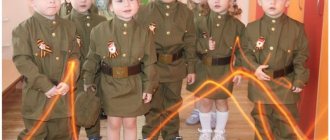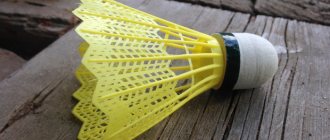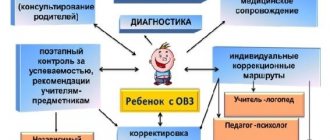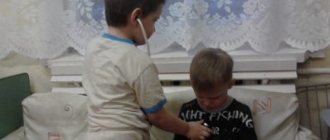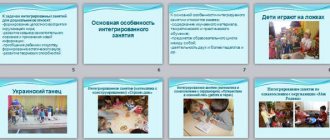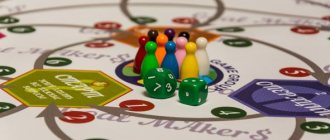- How does the system of advanced training for educators work according to the law?
- Why do teachers need to take advanced training courses?
- How can a teacher improve his category?
- Types of advanced training for teachers
- Where can I take advanced training courses?
- How does an online teacher training course work?
High demands are placed on the professionalism of educators, since they are entrusted with a responsible mission. The teacher not only monitors how the child behaves, he is responsible for the development of children and provides them with psychological support. In order to perform quality work, the teacher must constantly train and improve his skills.
Introduction
The Russian education system at the present stage of social development is undergoing significant changes associated with a change in the model of cultural and historical development. But no matter what reforms take place in the education system, in the end they, one way or another, are limited to a specific performer - the teacher. It is the teacher who is the main figure in the implementation of major innovations in practice. And for the successful introduction of various innovations into practice, for the implementation of the tasks assigned to him in new conditions, the teacher must have the necessary level of professional competence and professionalism.
People with higher or secondary specialized education are allowed to work as educators and subsequently undergo certification. Each teacher must pass certification for 1st, 2nd, etc. category as desired. Compliance with the position is required. For failure to complete the course, the director will be fined 5 thousand.
The world has changed, including the educational space. Preschool education is the first stage of the country's educational system. The Preschool Education Standard has been adopted, which not only expands educational freedoms and services, but also requires constant improvement of the professionalism of preschool teachers in creating an educational environment for the development of the child’s personality.
A preschool teacher needs to quickly and adequately respond to ongoing changes in education, be able to work in a team of like-minded people, and these are all participants in the educational process. Work competently and efficiently with children and parents in modern conditions, select content, implement it, checking it with the requirements of the “Law on Education in the Russian Federation” and the Federal State Educational Standard for Educational Education. And now it is important to determine ways to develop the educational system in preschool educational institutions in the context of the implementation of the Federal State Educational Standard for Preschool Education.
Where can I take advanced training courses?
Different types of institutions provide the opportunity to take advanced training courses. The most popular of them:
- Special centers and institutes of additional education They teach on various topics of a narrow and general focus. Typically, teachers and developers of such institutions are practitioners, that is, they actually know what it is to work with children. Therefore, they convey teaching experience, and not just theoretical knowledge, which is rare in modern education. An example of such an institution is ABiUS, which has been providing educational services for 20 years.
- On the basis of higher educational institutions. Candidates and doctors of sciences who are engaged in research and development in the field of additional education teach at such institutions. Most programs are only available in offline format.
- Research institutes, laboratories and research centers They offer a large selection of short-term courses. The emphasis in these courses is on the theoretical part.
When choosing a course, it is important to make sure that the course program complies with the Federal State Educational Standard and professional standards. If it does not meet these standards, then difficulties may arise.
The role of the teacher in the life of the child and society
In the educational process, in the context of the implementation of the Federal State Educational Standard, the issue of ensuring conditions for the development of the child’s personal growth comes to the fore. This is due to the need to integrate the individual into society as a creative individual, capable of mastering spiritual values and forming a specific selective orientation associated with the expansion of subjective meanings.
The most significant characteristics of the personality of a modern teacher in her fundamental research are highlighted by Professor Evgenia Vasilyevna Bondarevskaya [1]:
- Humanistic pedagogical position.
- Mastery of advanced pedagogical technologies.
- Accumulation and use of experience in creative activities.
- The ability to justify and build one’s own activities as a system.
- Possession of a culture of professional behavior, the ability for self-development (the ability to self-regulate one’s own personality and activities).
In our opinion, these personal characteristics most correspond to modern requirements for the professional activity of a teacher working with children who have health limitations. Possession of such qualities allows him to skillfully set and daily solve complex correctional and developmental tasks for correction and improvement:
- perceptions and ideas;
- memory and attention;
- imaginative thinking and self-esteem;
- emotional-volitional sphere of the child.
The teacher in the group is the bearer of a certain model of behavior, and children, being nearby during the day, see and hear how the teacher speaks, what his facial expression, intonation, and timbre of voice are. In some ways, consciously or unconsciously, they copy him.
A number of personal characteristics should include qualities that become professionally significant prerequisites for creating favorable relationships in the educational process. These qualities include patience, responsibility, commitment, objectivity, respect for people, optimism, emotional balance, the need for communication, interest in the lives of students, goodwill, restraint, responsiveness and many others.
Professional qualities of a preschool teacher
Important professional qualities of a teacher are hard work, efficiency, discipline, responsibility, the ability to set a goal, choose ways to achieve it, organization, perseverance, systematic and systematic improvement of one’s professional level, the desire to constantly improve the quality of one’s work, etc.
All modern researchers note that it is love for children that should be considered the most important personal and professional trait of a teacher, without which effective teaching activities are impossible.
Functions of a preschool teacher:
Constant communication with the child is the most important job function of a teacher. The teacher must be able to give age-appropriate answers to many questions. The life of children in a preschool institution depends on how correctly and how quickly the teacher finds an approach to each child and is able to organize it, whether the children will be calm, affectionate, and sociable or whether they will grow up restless, wary, and withdrawn.
Planning, organizing and conducting educational work.
Ensuring the protection and promotion of children's health.
Introducing children to national culture and traditions.
Coordination of the activities of the assistant teacher and other workers within the framework of a single educational process.
Developmental environment in preschool educational institutions as assistance in the work of a teacher
Personnel support for the introduction of the Federal State Educational Standard is also a very important point. Qualified, competent personnel, motivated to perform effective and high-quality work, are the key to the successful operation of a preschool institution. A new goal in education is being set: education, social and pedagogical support for the formation and development of a highly moral, responsible, creative, proactive, competent citizen of Russia. The standard will help us competently organize the educational space. The result of the introduction of the Federal State Educational Standard in preschool educational institutions should be the formation of an individual, original, highly effective system of pedagogical activity and methodological work. A preschool teacher needs to quickly and adequately respond to ongoing changes in education, be able to work in a team of like-minded people, and these are all participants in the educational process, work competently and efficiently with children and parents in modern conditions, select content, implement it, checking it with the requirements “ Law on Education in the Russian Federation" and the Federal State Educational Standard.
In the kindergarten, a special developmental environment is organized, and the educational process includes modern innovative educational technologies, which are aimed at developing intellectual, creative and cognitive activity in preschoolers in the context of the Federal State Educational Standard of preschool education.
In preschool groups and specialists' offices, developmental zones include games and aids that help develop visual perception, spatial orientation, and mathematical concepts.
Teachers are helped to develop the process of cognition and shape the cognitive abilities of children by purchasing and creating their own manuals using the innovative TRIZ system.
According to federal state requirements for the structure of the basic general education program of preschool education, the program must ensure the diversified development of children, taking into account their age and individual characteristics in the main areas: physical, social-personal, artistic-aesthetic, cognitive-speech[2].
It is advisable to use partial educational programs, because non-specialized comprehensive child development programs are quite difficult to adapt to the conditions of a child’s short-term stay in kindergarten. This is due, first of all, to the fact that comprehensive programs are mainly designed for a child to stay in kindergarten all day, as well as to the peculiarity of group recruitment - short-term groups are completed throughout the year and, mainly, on a multi-age basis. In addition, the chosen program should “allow” to organize routine moments in such a way that a number of the most important educational tasks are solved in a complex [3].
The program should:
- comply with the principle of developmental education;
- combine the principles of scientific validity;
- ensure the unity of educational, developmental and training goals;
- be built taking into account the principle of integration of educational areas;
- be based on the complex thematic principle of constructing the educational process.
When organizing a subject-development environment, it must be taken into account that play furniture should preferably be light and on wheeled devices, so that children themselves can create their own “interior”. A prerequisite is compliance with sanitary and hygienic requirements. The area of the room should not be less than the prescribed standards. The room for the group is bright and spacious. It is better to paint the walls from floor to ceiling or cover them with light-colored wallpaper (but with a certificate of conformity)[4].
You can also “deepen” 1-2 walls by painting them with a landscape with a good perspective. In order to visually enlarge the room, you can equip one wall with mirror coverings (this is also good for children to observe their movements, their beauty and plasticity). It is better to use not ordinary curtains, but only upper lambrequins or blinds. Each preschool institution, when forming a group, proceeds from its own conditions and capabilities. The design of the group can be varied.
Since sufficient space for children to move is a prerequisite, the fewer things there are in such a room, the better.
It is also advisable to place flowers as decoration. Indoor plants for decorative purposes in wall recesses, in various niches, as well as on the floor along the window in special stands.
In terms of protecting the health and preventing fatigue of children in the process of organized or independent activities, the need to provide this group with rational children's furniture deserves close attention. (It is important that the sizes of tables and chairs correspond to the height of children and are marked accordingly).
It is advisable to have a continuous carpet covering on the floor. It is important that the subject-development environment, the gaming environment, all materials, and their composition correspond to the psychophysiological characteristics of this age group (early, junior preschool and senior preschool age).
The standard places great importance on the processes of education. Training and education are combined into a holistic educational process based on spiritual, moral and sociocultural values and socially accepted rules and norms of behavior in the interests of the individual, family and society. Life in kindergarten for a child should become one big game with its own norms and rules, and the teacher will need great skill in presenting program material so that the child does not notice that he is being taught something, and he himself is the discoverer and researcher.
Types of advanced training for teachers
There are different types of advanced training for kindergarten teachers. They can take place both online and offline. For example:
- Short lectures and seminars up to 24 hours Typically they cover one or more topics.
- Short-term courses up to 72 hours These courses cover highly specialized issues. In general, the courses use an integrated approach, in which theoretical lessons alternate with practical exercises.
- Long courses from 100 hours These are more general programs that cover a large number of issues.
- Internships and joint scientific activities This format involves a lot of practical part.
At the end of any training, certification is carried out. If the teacher successfully passes it, he receives a document, a certificate of advanced training.
